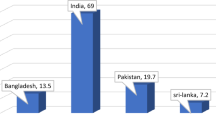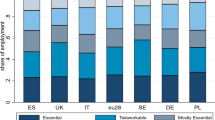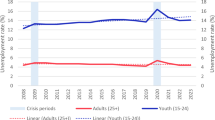Abstract
Departing from regulation theories and varieties of capitalism school this article focuses on employment in the third sector. We start by discussing the emergence of the new third sector in the western world. In the second part of the article, we provide an overview of the third sector in Portugal today. The ideal values of the organizations of the third sector, namely the principles of democratic and participative management, the primacy of people and work over capital, and the centrality of social capital, frame the discussion of empirical data regarding the wage relation that characterizes the University of Porto (UP) graduates currently working in the third sector. We end with a critical discussion of the optimistic expectations and projections that loom over the third sector regarding the construction of an alternative model of social and economic development based on justice and equity.
Résumé
Cet article, tout en se démarquant des théories de la régulation et des diverses écoles du capitalisme, s’intéresse à l’emploi dans le tiers secteur. Nous traitons tout d’abord de l’émergence du nouveau un nouveau tiers secteur dans le monde occidental. La seconde partie de l’article comporte une présentation du tiers secteur au Portugal de nos jours. Les valeurs idéales des organisations du tiers secteur, à savoir les principes de gestion démocratique et participative, la primauté des personnes et du travail sur le capital ainsi que le rôle central du capital social, constituent le cadre de la discussion de données empiriques afférentes à la relation salariale caractérisant les diplômés de l’Université de Porto (UP) travaillant actuellement dans le tiers secteur. Nous concluons par une discussion critique des attentes et projections optimistes qui se dessinent quant au secteur tertiaire concernant la construction d’un modèle alternatif de développement social et économique fondé sur la justice et l’équité.
Zusammenfassung
Dieser Beitrag weicht von Regulationstheorien und diversen Kapitalismuslehren ab und konzentriert sich auf die Beschäftigung im Dritten Sektor. Zunächst wird die Entstehung des neuen Dritten Sektors in der westlichen Welt diskutiert. Der zweite Teil des Beitrags enthält einen Überblick über den heutigen Dritten Sektor in Portugal. Die idealen Werte der Organisationen des Dritten Sektors, nämlich die Grundsätze des demokratischen und partizipativen Managements, der Vorrang von Menschen und Arbeit vor Kapial und die zentrale Stellung des sozialen Kapitals, sind Gegenstand der Diskussion der empirischen Daten hinsichtlich des typischen Vergütungsverhältnisses der Absolventen der Universität Porto, die derzeit im Dritten Sektor tätig sind. Der Beitrag endet mit einer kritischen Diskussion über die im Dritten Sektor entstehenden optimistischen Erwartungen und Prognosen hinsichtlich des Entwurfs eines alternativen Modells der auf Gerechtigkeit und Gleichheit beruhenden sozialen und wirtschaftlichen Entwicklung.
Resumen
Este artículo se centra en el empleo en el tercer sector partiendo de las teorías sobre regulación y las variedades de la escuela capitalista. Comenzamos analizando la aparición de un nuevo tercer sector en el mundo occidental. En la segunda parte del artículo, proporcionamos una visión general del actual tercer sector de Portugal. Los valores ideales de las organizaciones del tercer sector, en concreto los principios de gestión participativa y democrática, la primacía de las personas y el trabajo sobre el capital y el carácter central del capital social, modelan el debate sobre los datos empíricos referidos a la relación de los salarios que caracteriza a los licenciados de la Universidad de Porto (UP) que trabajan actualmente en el tercer sector. Finalizamos con un análisis crítico de las expectativas y proyecciones optimistas que surgen con respecto al tercer sector, en lo referido a la construcción de un modelo alternativo de desarrollo socioeconómico basado en justicia e igualdad.
摘要
本文着重探讨了第三产业的就业中违反规制理论之处和资本学派的种类。我们先是探讨了西方世界中新的第三产业的出现。而在文章的第二部分,我们提供了如今葡萄牙第三产业的概览。第三产业各组织团体的理想值,即民主参与式管理原则、员工的领先性以及资本和社会资本中心性研究,并详述了区分目前在第三产业中工作的葡萄牙大学毕业生的周薪相关实验数据。最后,我们严肃探讨了关于在公平公正基础上建立社会经济发展备选模型时,蔓延于整个第三产业的乐观估计和预计。
ملخص
هذه المقالة تركز على العمالة في القطاع الثالث مع الإبتعاد عن نظريات التنظيم وأنواع مختلفة من المدرسة الرأسمالية. نبدأ بمناقشة ظهور قطاع ثالث جديد في العالم الغربي. في الجزء الثاني من هذه المقالة، نقدم لمحة عامة عن القطاع الثالث في البرتغال اليوم. القيم المثالية لمنظمات القطاع الثالث، هي مبادئ الإدارة القائمة على المشاركة والديمقراطية، سيادة الشعب والعمل على رأس المال والدور المركزي لرأس المال الاجتماعي في إطار مناقشة البيانات التجريبية فيما يتعلق بعلاقة الأجور التي يتميز بها خريجي جامعة بورتو العاملين حاليا في القطاع الثالث. نحن ننهي بمناقشة حرجة للتوقعات المتفائلة والتنبؤءات التي تلوح في الأفق على القطاع الثالث فيما يتعلق ببناء نموذج بديل للتنمية الاقتصادية والاجتماعية التي تقوم على العدل والإنصاف.


Similar content being viewed by others
Notes
Research entitled “Precarious employment among University of Porto graduates of social sciences, humanities and administration and the alternatives for future insertion,” funded by the Fundação para Ciência e a Tecnologia (Portugal), reference POCTI/SOC/58441/2004.
The response rate of the online questionnaire survey was 21.3%.
Such as professional associations, trade unions, employers’ associations, political associations, youth associations and those defending rights and social causes.
We follow the European Commission recommendation 2003/361/CE, of 6th May 2003, of the number of employees for the definition of organization size.
References
Aglietta, M. (1982). Régulation et crises du capitalisme - l’experience des Etats Unis. Paris: Calmann-Lévy.
Anheier H. K. (2004). The third sector in Europe: Five thesis. In A. Zimmer & C. Stecker (Eds.), Strategy mix for nonprofits organisations: Vehicles for social and market integration. New York: Kluwer Academic, Plenum Publishers.
Boyer, R. (1985). Flexibilités des marchés du travail et/ou recherche d’ un nouveau rapport salarial? Working Paper No. 8522. CEPREMAT.
Boyer, R. (1986). La flexibilité du travail en Europe. Paris: La Découvert.
Boyer, R. (2005). How and why capitalisms differ. MPIfG discussion paper 05/4. Cologne: Max Planck Institute for the Study of Societies.
Campbell, M. (1999). The third system, employment and local development, Vol. I—synthesis report. Policy Research Institute Leeds Metropolitan University, United Kingdom, European Commission DGV. Retrieved May 26, 2008, from http://ec.europa.eu/employment_social/empl_esf/3syst/vol1_en.pdf.
Chaves, R., & Monzón, J. (2007). A Economia Social na União Europeia – Síntese. Bruxelles: International Center of Research and Information on the Public and Cooperative Economy (CIRIEC) and Comité Económico e Social Europeu (CESE).
Decree law nr. 119/83, February 25, 1983. (1983). Framework for non-profit organizations involved in social work. Diário da.República, nr 46 I. Série I. Parte A.
Estivill, J., & Darmon, I. (1999). Économie Sociale en Belgique, en France et en Italie: essai comparatif – version inachevée et provisoire diffusion restreinte. Barcelone: Gabinet D’Estudis Socials, Fondation MACIF, Commission Européenne DG V.
European Parliament. Resolução do Parlamento Europeu, de 19 de Fevereiro de 2009, sobre a economia social (2008/2250 [INI]). Retrieved June 01, 2009, from http://www.inscoop.pt/Inscoop/comunicacao/docs/.
Evers, A., Laville, J.-L., Borzaga, C., Defourny, J., Lewis, J., Nyssens, M., et al. (2005). Defining the third sector in Europe. In A. Evers & J.-L. Laville (Eds.), The third sector in Europe. UK: Edward Elgar.
Evers, A., & Laville, J.-L. (Eds.). (2005). The third sector in Europe. UK: Edward Elgar.
Ferreira, S. (2009). Terceiro sector. In A. S. Gattani, J.-L. Laville, L. I. Gaiger, & P. Hespanha (Coord.), Dicionário Internacional da Outra Economia. Coimbra: Almedina.
Franco, R. C., Sokolowski, S. W., Hairel, E. M., & Saloman, L. M. (2005). O sector não lucrativo português numa perspectiva comparada. Porto: Faculdade de Economia e Gestão da Universidade Católica Portuguesa/Johns Hopkins University.
Freire, J. (2008). Economia e Sociedade. Contributos para uma Sociologia da Vida Económica em Portugal na viragem do século. Lisboa: Celta.
Gattani, A. S., Laville, J.-L., Gaiger, L. I., & Hespanha, P. (Coord.). (2009). Dicionário Internacional da Outra Economia. Coimbra: Almedina.
Giddens, A. (1998). The third way: The renewal of social democracy. Cambridge: Polity Press.
Gourevitch, P., & Hawes, M. (2001). Understanding national production systems: comparative capitalism in the globalized economy. Annual meeting of the American Political Science Association. California: University of California at San Diego.
Hall, P., & Soskice, D. (Eds.). (2001). Varieties of capitalism: The institutional foundations of comparative advantage. Oxford: Oxford University Press.
Inoué, Y., & Yamada, T. (2002). Japan: Demythologizing regulation. In R. Boyer & Y. Saillard (Eds.), Regulation theory: The state of the art. London: Routledge.
Instituto de Gestão Financeira da Segurança Social IP. (2008). Conta da Segurança Social 2008. Lisboa: Ministério do Trabalho e da Solidariedade Social. Instituto de Gestão Financeira da Segurança Social IP. Departamento de Orçamento e Conta.
International Center of Research and Information on the Public and Cooperative Economy (CIRIEC). (2000). As Empresas e Organizações do Terceiro Sector – um desafio estratégico para o emprego. Lisboa: Instituto António Sérgio do Sector Cooperativo.
Jessop, B., & Sum, N.-L. (2006). Beyond the regulation theory. Massachusetts: Edward Elgar Publishing.
Maia, L. (2009). Terceiro sector. Autonomia e responsabilidade. SGS Global, 25, 28–29.
Nunes, F., Reto, L., & Carneiro, N. (2001). O Terceiro Sector em Portugal: delimitação, caracterização e potencialidades. Lisboa: Instituto António Sérgio do Sector Cooperativo.
Quintão, C. (2007). Empresas de Inserción y empresas sociales en Europa. Revista CIRIEC-España, Revista de Economía Pública, Social y Cooperativa, 59, 33–59.
Quintão, C. (2008). Third sector renewal in Portugal: A preliminary overview. In The third sector and sustainable social change: New frontiers for research, July 9–12. Spain: CIES—University of Barcelona.
Quintão, C., Martinho A. L., & Parente, C. (2007). Plano estratégico de qualificação das pessoas e das organizações do terceiro sector no concelho de Barcelos 2007/2013. Relatório de projecto. Porto: A3S.
Rebelo, G. (2004). Flexibilidade e precariedade no trabalho. Lisboa: Edição de autor.
Rodrigues, M. J. (1988). O sistema de emprego em Portugal. Crise e mutações. Lisboa: Publicações Dom Quixote.
Salamon, L., Anheier, H., List, R., Toepler, S., & Sokolowski, S. W. (1999). Global civil society: Dimensions of the nonprofit sector. The Johns Hopkins Comparative Nonprofit Sector Project. Baltimore: The Johns Hopkins Center for Civil Society Studies.
Santos, B. S. (1993). O Estado, as relações salariais e o bem-estar social na semiperiferia: o caso português. In B.S. Santos (Org.), Portugal: um retrato singular. Porto: Afrontamento.
Santos, B. S. (1999). A Reinvenção Solidária e Participativa do Estado, Oficina do CES. Coimbra: Centro de Estudo Sociais.
Author information
Authors and Affiliations
Corresponding author
Rights and permissions
About this article
Cite this article
Parente, C. Qualified Employment in the Third Sector in Portugal. Voluntas 23, 257–276 (2012). https://doi.org/10.1007/s11266-011-9190-8
Published:
Issue Date:
DOI: https://doi.org/10.1007/s11266-011-9190-8




